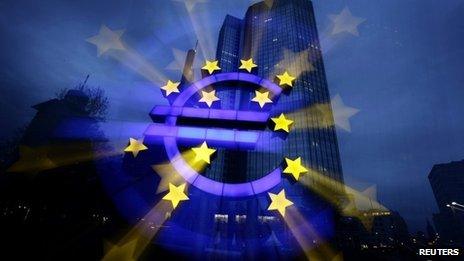ECB's divisions over help for Cyprus banking system
- Published

It was late 2012 and early the following year that the Cypriot banking sector was on the brink. The whole eurozone was watching with anxiety.
Given the high stakes it's entirely predictable that the strains should infect the conservative world of the eurozone's central banks.
All the same, it is a striking tale that the New York Times (NYT) has got hold of.
The paper has seen the minutes of some meetings of the European Central Bank's Governing Council.
The documents were supposed to be secret for thirty years. It is easy to see why the ECB would prefer the arguments that broke out as the eurozone lurched towards another crisis to remain private.
The issue at the heart of this story was emergency lending to Cyprus Popular Bank (also known as Laiki Bank).
The NYT reports that the president of the German Bundesbank, Jens Weidmann, was worried that too much support was being provided.
He was also said to be concerned that the collateral provided by Popular Bank was worth less than the ECB's governing were told it was worth. And he said so forcefully.
Key voice
There are some of key bits of background to this story.
First, despite the creation of the European Central Bank, individual national central banks still exist and have some important functions.
In some circumstances they can provide emergency loans to banks that are struggling to raise the funds they need in the markets. It's called Emergency Liquidity Assistance, ELA. But there are rules about how it's done, and the ECB's Governing Council can put a stop to it.
The Council is the committee which takes the key policy decisions. It includes the six top executives at its Frankfurt headquarters, and the head of each of the national central banks.
One of those national central bank governors is Jens Weidmann. He is seen as a key voice for central banking orthodoxy, including sticking to the rules of the ELA.
The ELA is only supposed to be available to banks that are solvent but face temporary difficulty raising the funds they need to make all the payments that come due.
This can happen if a bank has long term loans that they cannot call in and they have short term debts that they would normally pay off by borrowing new money.
According to the NYT it appears the German central bank chief was not convinced that Cyprus Popular Bank was really eligible for help. The paper reports Mr Weidmann as saying: "It was not the governing council's job to keep afloat banks that were awaiting recapitalization and were not currently solvent".
And it seems his concerns were at least partly shared by national central bank chiefs from France and the Netherlands.
Warning
The complaints were rejected by the Cypriot central banker Panicos Demetriades (if you followed the story closely at the time you might well remember his first name).
The story as related by the NYT does suggest some serious arguments within the eurozone's central banking system.
As a postscript to this episode, not long after the period covered, the ECB did publicly threaten to stop the emergency lending to Cypriot banks unless the country's government agreed a bailout with the IMF and the European Union.
The deal was duly done, so the threat was not carried out.
Nonetheless Popular Bank was subsequently wound up and its operations absorbed by Bank of Cyprus (another commercial bank, not to be confused with the country's central bank.)